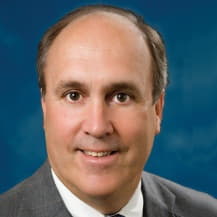
Jay Silverstein
Click here for Part I
Simplifying the health insurance market through revolutionary and easy to use analytics tools
Jay Silverstein is the CEO of Picwell, a healthcare startup dedicated simplifying employees’ healthcare choices. Based in Philadelphia, PA, Picwell uses predictive, statistical algorithms that analyze nearly a million variables and are tailored to individual consumers’ lifestyles to deliver highly personalized, scored healthcare plan choices. The system improves incrementally with each new Picwell user, adding value and additional savings for consumers over time. Jay’s career in healthcare goes back to 1985; prior to working on Picwell, he held leadership roles at UnitedHealthcare, Medco, and Oxford Health Plans.
Jay spoke with Reid Blynn of Newmark Grubb Knight Frank for this interview.
REID BLYNN:
Could you take us through your business strategy?
JAY SILVERSTEIN: We’ve built our business around large aggregators, if you will. We attacked the market a little differently. We went at the market with the idea of going after it and building an industrial strength product, and working with those who were really deeply embedded in the healthcare system. So, we launched with Aon, within their group retiree business. That was 700,000 lives and 5000 agents. We expanded from there across their active book of business, and now we’re rolling out with Cigna across their active book of business.
In the course of the next year, we’ll be rolling out with many, many blue [shields] plans across the country, as well as make private exchanges and things of that sort. We’re not a direct-to-consumer play even though the end beneficiary of our product is a consumer. We like to think of the model that we’ve developed as one of Pareto optimal. In fact, our mascot is Vilfredo, as in Vilfredo Pareto. I guess that’s what happens when you have economists as some of your founders. But it’s the idea of the win-win scenario, whereby a carrier can win and a consumer can win; whereby an employer can win and a consumer can win; whereby a broker can win and a consumer can win; but one constant is always there: the consumer wins.
Q. Tell us about your employees.
A. One of the other things that makes Picwell extremely unique is that we’ve put together a team of leaders across the multiple disciplines that need to be contemplated when making these decisions or being involved in the decision support. It was built and designed by famous economists from Penn, Berkeley, MIT, and Wharton. They were sitting and challenging students continually, and looking at doing academic studies and challenging students to actually come up with the problems and say, “Why don’t we fix this problem?” And so Picwell was born. So, in the spirit of “it’s not just what you say, but how you say it,” the first thing we’ve done is we said, “all right—let’s go get some of the leading health economists in the world.” And that’s actually some of the founders: John Kolstad, who was at Wharton, who’s now associate professor at Berkeley and has published numerous papers on choice and choice error both in the employer setting as well as the ACA type of settings, or marketplace settings. Bob Town is a professor at Wharton and he spends an enormous amount of time working on those types of things and the values of networks and being able to build a model.
Q. How have these economists given Picwell an edge?
A. This is where I think we’re unique: we’ve been able to build a model through these fantastic economists and data scientists that actually create unit values for the various factors involved in a health plan decision. What’s really special about the Picwell score is that for each individual—or each cluster, if you will—the composition of that score varies. What’s good for the goose may not be good for the gander. As an individual, if I’m a 30-year-old male who never seeks any health care services, then a doctor network and rich benefits are not really that important to me, but what might be important to me is a Fitbit. If I’m a 32-year-old female with two young children, what might be very important to me is the pediatrician—and not only that, but the benefits that relate to that, as well as some of the other benefits. All of that is brought into play, not just as a predicted utilization, but woven into the Picwell score. Bob and John are instrumental in our abilities to deliver on that.
In addition, we’ve realized that—again, “not just what you say but how you say it”—we need to bring in behavioral economists. Sometimes the behavioral economists don’t necessarily get along with the other economists, but we brought in Eric Johnson. Eric is another outstanding thought leader in the world of why people make the decisions they make. In fact, he’s a key advisor to the Nederlander, which has been around for years. Obamacare actually used it as a model. Eric helps us think about our user interface, our presentation layer, and why people do what they do.
Q. Can you talk a bit more about the technology side?
A. It’s important to have technology that works, to be able to serve up this information quickly and to integrate. That’s always been one of the challenges in the healthcare space, when you’re dealing with carriers or you’re dealing with platforms: the ability to integrate data, to bring it to life for the consumer. [Picwell co-founder and CTO] Ani Vemprala, who also graduated recently from Wharton and spent time at Adify and in Silicon Valley ad tech, has built a platform that enables us to integrate quickly, seamlessly, and perfectly with regards to carriers or exchanges or platforms. And then, in the middle of our group, you have the grizzly old veterans—the people who sat across a formica counter and actually have enrolled thousands, if not tens of thousands of individuals: Kevin Hill and Paul Kusserow. Paul Kusserow is from Humana, and Kevin Hill was at Oxford. I was one of the principals of Oxford Health Plans. I spent a lot of time at United, and I actually had to stand up at the very advent of the HMO category and try to introduce people to an entirely new way of buying benefits and watch their eyes roll, or their confusion. So you marry that real world experience with the power of data, and the power of technology and you have Picwell.
Connect with Jay on LinkedIn
ABOUT NEWMARK GRUBB KNIGHT FRANK
Newmark Grubb Knight Frank (NGKF) is one of the world's leading commercial real estate advisory firms. Together with London-based partner Knight Frank and independently-owned offices, NGKF’s 12,800 professionals operate from more than 370 offices in established and emerging property markets on six continents.
With roots dating back to 1929, NGKF’s strong foundation makes it one of the most trusted names in commercial real estate. NGKF’s full-service platform comprises BGC’s real estate services segment, offering commercial real estate tenants, landlords, investors and developers a wide range of services including leasing; capital markets services, including investment sales, debt placement, appraisal, and valuation services; commercial mortgage brokerage services; as well as corporate advisory services, consulting, project and development management, and property and corporate facilities management services. For further information, visit www.ngkf.com.
NGKF is a part of BGC Partners, Inc., a leading global brokerage company servicing the financial and real estate markets. BGC’s common stock trades on the NASDAQ Global Select Market under the ticker symbol (NASDAQ: BGCP). BGC also has an outstanding bond issuance of Senior Notes due June 15, 2042, which trade on the New York Stock Exchange under the symbol (NYSE: BGCA). BGC Partners is led by Chairman and Chief Executive Officer Howard W. Lutnick. For more information, please visit www.bgcpartners.com.

Reid Blynn, Executive Managing Director at Newmark Grubb Knight Frank (NGKF), has been a leader in Philadelphia’s commercial real estate brokerage community for nearly 30 years. Reid has completed over 1000 transactions representing over eight million square feet.
Today Reid devotes his full attention to his corporate real estate and tenant representation services practice. He has represented many Philadelphia-based corporations for corporate headquarters requirements. By concentrating his practice in representing tenant and corporate clients, Reid is able to avoid potential conflicts with the region’s property owners, thus ensuring his clients receive the full benefit of his advocacy.
Reid has close ties to the venture capital community and has represented many growing venture backed companies in the health care, IT and life sciences sectors. Long term relationships have enabled him to work outside of Philadelphia as his clients grow outside of the region. Presently, multi-market corporate work is the fastest growing sector of Reid’s practice.


Edwin Warfield, CEO of citybizlist, conducts the CEO Interviews.
If you're interested in reaching CEOs, please contact edwin.warfield@citybuzz.co
Connect on LinkedIn









